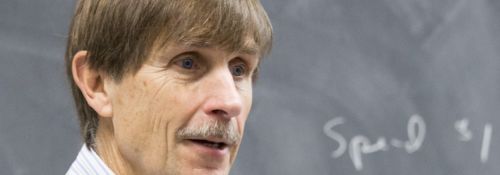
Choosing Between Economics and Business Studies
Written by Emily Marsh
Maybe you took Principles of Microeconomics to satisfy the social sciences component of the core, and you were intrigued by the systematic approach to studying human behavior. Or maybe you’ve always known you wanted to study how money moves around in our economy. Or you’re interested in starting a business or understanding a more technical side of policy. Lots of different interests bring students into the Economics, Business, and Accounting Department.
Once you get there, though, it can be hard to choose your actual major. There are so many options, and sometimes they overlap. Your first choice is between economics and business. Then, if you choose business, you pick between accounting, international business, financial management or marketing and management. Sounds like a lot, right? Making the decision may seem overwhelming, but by learning about the different majors, your interest will probably become clearer.
What’s the difference?
The first step to picking your major from this department is realizing the different emphases of each field. While business focuses on interpersonal management and turning a profit in the realms of financial management, marketing, or accounting, economics studies human behavior in the context of the economy as a whole. Political economy combines the economic way of thinking with history and politics.
What happens next?
You can also think of what you’re interested in doing after school. Many economics majors pursue a master’s or PhD and become an economist to research economic trends, policies, or business decisions. With a bachelor’s, they can help conduct research, work at many jobs in the government, or take on many positions in business. If you are not sure if you want to work in the public or private sector, a degree in economics offers a lot of flexibility.
Business majors deal primarily in the private sector. They focus on how to make good decisions to maximize profit while keeping costs low and both employees and consumers happy. Business deals more with finances than economics. Often, entrepreneurs study business to learn how to manage companies and make good decisions for their own company.
One concentration of business is accounting. Unsurprisingly, many accounting majors become accountants, but not all of them! With a degree in accounting, you can work in bookkeeping, investigate companies’ records for law enforcement, assess risks for businesses, or offer private financial consulting.
Financial management focuses on advising individuals and companies in investments and risk management. It will prepare you to make smart business decisions and understand the consequences of those decisions.
The marketing/management major teaches students to create a brand and a mission for businesses. Combining creativity with business, marketing majors learn how to promote themselves and the businesses they will work for.
Political economy is a special interdisciplinary major at Hillsdale, meant to study how economics, politics, and history fit together. Many political economy majors move to D.C. to work in the public sector after graduation. The political economy major also prepares students to attend law school.
Why Hillsdale?
Hillsdale’s Business, Economics, and Accounting Department offers students the opportunity to specialize to pursue their specific goals after graduation. All fields emphasize the importance of the free-market in economics thought and the power of a democratic society. The Course Catalog says, “The Department offers a distinctly ‘Hillsdale’ approach to economics and business administration, utilizing the methodology and context of a liberal arts college to present the nature, scope, and function of economic exchange and business decision-making within a democratic, free market society.” By teaching students the practical side of business, while also teaching the liberal arts, Hillsdale is able to graduate competent and well-rounded business leaders.
For further reading:
Spotlight on Dr. Michael Clark
 Emily Marsh, ’23, studies economics and mathematics. She is a self-diagnosed coffee addict, and she loves the water, meeting new people, and writing (on the good days). Her favorite part of being on campus is people watching when she’s supposed to be doing homework.
Emily Marsh, ’23, studies economics and mathematics. She is a self-diagnosed coffee addict, and she loves the water, meeting new people, and writing (on the good days). Her favorite part of being on campus is people watching when she’s supposed to be doing homework.
Published in December 2020